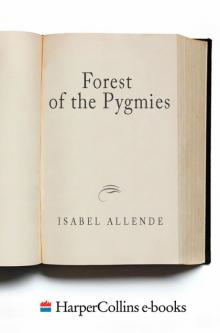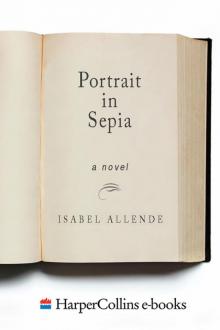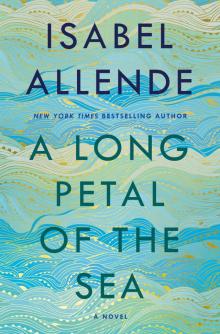- Home
- Isabel Allende
A Long Petal of the Sea Page 18
A Long Petal of the Sea Read online
Page 18
Victor received Ofelia’s letter with the resignation of someone expecting it, and prepared for it. He had never believed their love would prosper, because as Roser indicated from the start, it was a plant without roots that was bound to wither. Nothing can grow in the shade of secrets, she would say, love needs light and space to flourish. Victor read the letter twice and handed it to Roser. “You were right, as ever,” he told her.
Roser had only to glance at it rapidly to read between the lines and grasp that Ofelia’s deathly cold tone only barely concealed an immense anger. She thought she understood the reason, which was not merely the lack of a future with Victor or a capricious young woman’s reaction. She guessed Ofelia had been kidnapped by her family to hide the shame of a pregnancy, but decided not to share her suspicion with Victor, because it seemed too cruel. What need was there to torment him with yet more doubts? She saw Ofelia as very vulnerable and naïve, and felt a mixture of sympathy and pity for her; she was a Juliet swept up in the whirlwind of an adolescent passion, but instead of a youthful Romeo, she had become involved with a battle-hardened man.
She left the letter on the kitchen table, took Victor by the hand, and led him to the couch, the one piece of comfortable furniture in their modest house. “Lie down, I’ll scratch your head.” As Victor lay on the couch with his head in Roser’s lap and surrendered to the gentle touch of her pianist’s fingers in his hair, he felt certain that as long as she existed, he wouldn’t be alone in this world of misfortune. If with Roser the worst memories were bearable, so too would be the hole Ofelia had left in the center of his chest. He would have liked to unburden himself of the pain choking him, but he didn’t have the words to describe what he had experienced with her, or how at a certain point she had wanted them to run away together, how she had sworn they would always be lovers. He couldn’t tell her, but Roser knew him only too well and, doubtless, was already aware of it. They were interrupted when Marcel woke from his siesta and screamed for them.
Roser’s intuition had not failed her regarding Ofelia’s emotions. As the days went by after her condition became known to her family, her passion was gradually transformed into a smoldering anger raging inside her. She spent hours analyzing her behavior and examining her conscience as Father Urbina demanded, but instead of repenting for her alleged sin, it was her obvious stupidity she repented of. It had never occurred to her to ask Victor what they should do to avoid a pregnancy, because she assumed he had it under control and that, anyway, they met so infrequently it wouldn’t happen. Magical thinking. Since he was older and more experienced, Victor was to blame for this unforgivable accident; and yet as the victim, she had to pay for both of them. That was a monumental injustice.
She could scarcely recall why she had clung so tightly to that hopeless love for a man with whom she had so little in common. After being in bed with him, always in some sordid room, rushed and uncomfortable, she was as frustrated as with Matias’s clumsy fumbling. She supposed it would have been different if they had been more trusting and had more time to get to know each other, but she didn’t have that with Victor. She had fallen in love with the idea of love, romance, and the heroic past of her warrior, as she would often call him. She had lived an opera whose outcome had to be tragic. She knew Victor was in love with her—at least, as much in love as a heart full of scars can be, but on her side it was nothing more than an impulse, a fantasy, another of her whims. She felt so nervous, trapped, and ill that the details of her adventure with Victor, even the happiest ones, were distorted by her terror that she had ruined her life. For him it had been pleasure with no risk; for her there was risk with little pleasure. And now finally she was suffering the consequences, while he could carry on with his life as if nothing had happened.
She hated him. She hid from him the fact that she was pregnant, fearing that if he knew it, Victor would claim his position as father and refuse to leave her in peace. She was the one who had to make all the decisions concerning her pregnancy; no one else had any right to give their opinion, least of all that man who had already caused her enough harm. None of this was in the letter, but Roser sensed it.
At the end of three months, Ofelia was no longer sick, and was filled with an upsurge of energy she had never before experienced. By sending her letter to Victor she had closed that chapter, and within a few weeks no longer tormented herself with memories or speculation over what might have been. She felt liberated from her lover, strong, healthy, with the appetite of an adolescent. She strode out for long walks in the countryside followed by her dogs; went into the kitchen to bake an endless supply of biscuits and buns to be handed out to the children on the estate; and enjoyed herself painting daubs with Leonardo, huge colored splotches that seemed to her more interesting than the landscapes and still lifes she had painted in the past; to the laundry maid’s consternation, she took to doing the ironing, and spent hours surrounded by heavy flat irons, perspiring and happy. “Let her be, she’ll soon get over it,” Juana predicted. Doña Laura was shocked by Ofelia’s sunny disposition: she was expecting to see her bathed in tears as she knitted baby clothes, but Juana reminded her that she herself had experienced several months of euphoria during her pregnancies before the weight of her belly became unbearable.
Felipe visited the estate once a week to deal with the accounts, the expenses, and instructions for Juana, who ran the house as usual while her mistress was preoccupied with complex negotiations with the saints. He brought news from the capital, which nobody was interested in, pots of paint and magazines for Ofelia, teddy bears and rattles for Baby, who no longer spoke and had gone back to crawling everywhere. Vicente Urbina appeared once or twice with his odor of sanctity, as Juana Nancucheo called it, but which in reality was nothing more than the stench of his sweaty cassock and shaving lotion. He came to take stock of the situation and guide Ofelia along her spiritual path, and to encourage her to make a full confession. She listened to his wise words with an absent air like a deaf person, showing not the slightest emotion at the prospect of becoming a mother, as if it was a tumor she had in her stomach. Father Urbina thought this would make adoption far easier.
* * *
—
THEIR STAY IN THE country would last throughout the summer and into the winter, and had the virtue of gradually easing Doña Laura’s frantic pleas to the heavens. She didn’t dare ask for the miracle of a miscarriage, which would have solved the family’s problem, because that was as serious as wishing her husband dead, but she subtly hinted at it in her prayers. The peacefulness of nature, with its unchanging, tranquil rhythm, the long days and quiet nights, the warm, frothy milk from the barn, the huge bowls of fruit and the delicious-smelling bread fresh from the clay oven, all suited her timid temperament much more than the hustle and bustle of Santiago. If it had been up to her, she would have lived there permanently. Ofelia also relaxed, and her hatred for Victor gave way to a feeling of vague resentment; he was not the only one to blame, she too was partly responsible. She began to think of Matias Eyzaguirre with a certain nostalgia.
The house was colonial and ancient: thick adobe walls, red roof tiles, wooden beams, and tiled floors. Unlike other houses in the region, it had resisted the 1939 earthquake well: only some of the walls were cracked and only half the tiles fell off. In the disorder following the earthquake, attacks on properties in the area increased; there were good-for-nothings scavenging, and a high level of unemployment, the result of the worldwide economic depression of the 1930s as well as the crisis in the saltpeter industry, when natural saltpeter was replaced by a synthetic one, causing thousands of workers in Chile to lose their jobs. The effects of these events were still being felt nearly a decade later. In the countryside robbers poisoned guard dogs and got in at night to steal fruit, hens, sometimes a pig or a donkey to sell.
But Ofelia was unaware of any of this. During the summer days, which seemed to stretch out endlessly, she avoided the heat by restin
g in the cool corridors or drawing bucolic scenes, now that Baby was no longer able to join her in daubing big canvases with a brush. On small pieces of card stock, she sketched the hay cart pulled by oxen, sleepy-eyed cows in the dairy, the hen yard, washerwomen, the grape harvest. Isidro made no money from his wine, but to him it was essential to be seen as a wine producer, part of that exclusive club of well-known families.
* * *
—
THE SIXTH MONTH OF Ofelia’s pregnancy coincided with the start of autumn: the sun set early, and the dark, cold nights seemed endless. They kept warm with blankets and coal braziers, and used candles for lighting, as it would be years before electricity was installed in these remote regions. Ofelia was not greatly affected by the cold, as the euphoria of the previous months had given way to a sea lion–like heaviness that was not merely bodily (she had put on thirty-five pounds and her legs were swollen like hams) but of the soul as well. She no longer sketched on her cards, took walks through the fields, read, knitted, or embroidered, because she would fall asleep within five minutes. She allowed herself to continue putting on weight, and was so negligent that Juana Nancucheo had to force her to bathe and wash her hair. Her mother warned her that she herself had borne six children, and that if she had taken care of herself she might have kept some of her youthful good looks. “What does it matter, Mama? Everyone says I’m ruined, so who cares how I look? I’m going to be a fat old spinster.”
She placed herself meekly in the hands of Father Urbina and her family, and played no part in the decisions about the imminent baby. In the same way that she agreed to stay hidden in the countryside and live in secret, taking upon herself the shame the priest and circumstances finally inculcated in her, so she became convinced that adoption was inevitable. There was no other way out for her. Around the seventh month she could no longer imagine she had a tumor in her stomach, and could clearly feel the presence of the being she was carrying. Previously, the signs of life had been no more than the flutter of a frightened bird’s wing, but now when she felt her belly she could follow the tiny body’s outline, identify a foot or the head. She took up her pencil once more to draw boys and girls who looked like her, with not a single one of Victor Dalmau’s features.
Every two weeks a midwife came to see Ofelia, sent by Father Urbina. Her name was Orinda Naranjo and, according to the priest, she knew more than any doctor about women’s illnesses, as he called anything related to reproduction. She inspired confidence at first glance, with the silver cross around her neck, her nurse’s uniform, and her medicine bag containing all the tools of her trade. She measured Ofelia’s stomach, took her blood pressure, and talked to her in the mawkish tone of someone addressing a dying person. Ofelia was profoundly suspicious of her, but made an effort to be friendly, knowing the woman would be crucial at the moment of birth. Since she had never kept track of her menstruation or of the meetings with her lover, she had no idea when she had become pregnant; Orinda Naranjo calculated the approximate due date by the size of her stomach. She predicted that as this was Ofelia’s first child and she had grown fatter than normal, it would be a difficult birth, but there was no need to worry, because she had brought more children into the world than she could remember. She recommended they transfer Ofelia to the convent in Santiago, which had an infirmary containing all that was necessary and was close to a private clinic. They followed her advice. When Felipe came in the family car to transport his sister, she was unrecognizable: fat, blotchy-faced, dragging her enormous feet along in a pair of slippers, and wearing a poncho that smelled of lamb. “Being a woman is a misfortune,” she told him by way of explanation. Her baggage consisted of two maternity dresses as voluminous as tents, a man’s thick cardigan, her paint box, and a suitcase filled with the fine clothes her mother and Juana had prepared for the baby. What little she herself had knitted turned out misshapen.
* * *
—
ONE NIGHT A WEEK after her arrival at the convent, Ofelia suddenly awoke from a troubling dream covered in sweat and with the sensation that she had slept for months in a lengthy twilight. She had been given a cell containing an iron camp bed, a horsehair mattress, two rough raw woolen blankets, a chair, a drawer to keep her clothes in, and an unpolished wooden table. She didn’t need anything more, and was thankful for this Spartan simplicity, which suited her state of mind. The cell window gave on to the nuns’ garden, with a Moorish fountain at its center, surrounded by old trees, exotic plants, and wooden boxes filled with medicinal herbs. The garden was crossed by narrow stone paths with wrought iron arches that would be covered with climbing roses in the springtime.
After her abrupt awakening amid the wintry light of late morning and the cooing of a dove outside her window, it took her a minute or two to realize where she was and what had happened to her and why she was imprisoned in this mountain of flesh that was so heavy she could hardly breathe. Lying there still for several minutes allowed her to recall details of the dream, in which she was the light, agile young woman she had once been, dancing barefoot on a black sand beach, with the sun on her face and her hair ruffled by the salty breeze. All at once the sea became rougher, and a wave threw a little girl covered in scales like a mermaid’s offspring up onto the shore. Ofelia remained in bed when she heard the bell for Mass, and was still there an hour later when a novice came by banging a triangle for breakfast. For the first time in months, she had no appetite, and preferred to doze for the rest of the morning.
At the rosary hour that same evening, Father Urbina came to visit her and was received by a flurry of black habits and white wimples, a noisy throng of fawning women kissing his hand and asking his blessing. He was still a haughty young man, who seemed to wear his cassock as a disguise. “How is my protégée?” he inquired good-naturedly once he was installed with a cup of thick hot chocolate. The nuns sent for Ofelia, who waddled in like a frigate, swaying on her massive legs. Urbina held out his consecrated hand for the customary kiss, but she shook it in a firm greeting.
“How do you feel, my child?”
“How do you expect me to feel with a watermelon in my belly?” she retorted.
“I understand, my child, but you must accept your discomfort. It’s normal in your condition: offer it up to God Almighty. As the holy scriptures say: man has to work by the sweat of his brow, and woman has to give birth in pain.”
“As far as I can tell, Father, you don’t sweat when you work.”
“Well, well, I can see you’re agitated.”
“When is my aunt Teresa coming? You said you would arrange permission for her to be with me.”
“We’ll see, my child. Orinda Naranjo tells me we can expect the birth in a few weeks. Call on Our Lady of Hope to come to your aid, and make sure you are free of sin. Remember that many women render up their souls to God in the act of giving birth.”
“I have confessed and taken communion every day since I’ve been here.”
“Has it been a complete confession?”
“You want to know if I told my confessor the name of the father of this child…It didn’t seem to me necessary, because what matters is the sin, not with whom one sins.”
“What do you know about categories of sin, Ofelia?”
“Nothing.”
“An incomplete confession is the same as not having confessed at all.”
“You’re dying of curiosity, aren’t you, Father?” said Ofelia with a smile.
“Don’t be so insolent! My priestly duty is to lead you along the right path. I suppose you know that.”
“Yes, Father, and I’m truly grateful. I don’t know what I would have done in my situation without your help,” she said in such a humble tone it sounded like irony.
“Well, my child, you have been lucky all the same. I’ve brought good news. I’ve carried out rigorous searches for the best possible couple to adopt your baby, and I can tell you now that I believe I�
��ve found them. They’re very good, hardworking people, in a comfortable economic position, and Catholic, of course. I cannot tell you anything more, but don’t worry, I’ll watch over you and your child.”
“It’s a girl.”
“How do you know?” asked the startled priest.
“Because I dreamed it.”
“Dreams are just that: dreams.”
“There are prophetic ones. But whether it’s a boy or a girl, I’m its mother and I intend to bring it up. You can forget about adoption, Father Urbina.”
“What are you saying, for the love of God!”
Ofelia’s decision proved unshakable. The priest’s argument and threats couldn’t make her change her mind. Later on, when her mother and her brother Felipe arrived to try to convince her, backed up by the mother superior, she listened to them slightly amused, as if they were speaking the language of pharisees. However, the avalanche of excessive reproaches and dire warnings eventually had their effect, or perhaps it was one of those winter viruses that killed dozens of old people and children every year. Ofelia came down with a high fever, talking deliriously about mermaids, prostrate from back pain and exhausted by a cough that kept her from eating or sleeping. The doctor Felipe brought prescribed tincture of opium diluted in red wine and several medicines in blue bottles labeled only with numbers. The nuns treated her with herbal infusions from the garden and hot linseed poultices for her congested lungs.
Six days later, her chest had been somewhat burned by the poultices, but she felt better. Assisted by two novices who had been at her side day and night, she got up and managed to shuffle to the small leisure room in the convent, where the nuns met during their free moments. It was a cheerful place bathed in natural light, with a shiny wooden floor and potted plants, presided over by a statue of the Virgin of Carmen, Chile’s patron saint, holding the infant Jesus in her arms, both wearing imperial crowns of gilded tin. Ofelia spent the morning covered with a blanket in an armchair, staring blankly at the cloudy sky through the window and raised to paradise by the miraculous combination of opium and alcohol. Three hours later, when the novices helped her stand up, they saw the stain on the chair and the blood trickling down her legs.

 The Stories of Eva Luna
The Stories of Eva Luna The House of the Spirits
The House of the Spirits Paula
Paula Ines of My Soul
Ines of My Soul Of Love and Shadows
Of Love and Shadows Kingdom of the Golden Dragon
Kingdom of the Golden Dragon Daughter of Fortune
Daughter of Fortune City of the Beasts
City of the Beasts Maya's Notebook
Maya's Notebook Eva Luna
Eva Luna Zorro
Zorro In the Midst of Winter
In the Midst of Winter Forest of the Pygmies
Forest of the Pygmies My Invented Country: A Nostalgic Journey Through Chile
My Invented Country: A Nostalgic Journey Through Chile The Japanese Lover
The Japanese Lover Portrait in Sepia
Portrait in Sepia Island Beneath the Sea
Island Beneath the Sea The Soul of a Woman
The Soul of a Woman A Long Petal of the Sea
A Long Petal of the Sea Ines of My Soul: A Novel
Ines of My Soul: A Novel The Sum of Our Days
The Sum of Our Days